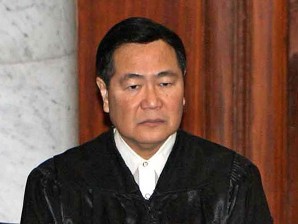2 justices warn SC majority against suppressing dissenting opinions
MANILA, Philippines – Warning against suppression or obstruction of a justice’s right to express a dissenting opinion, two Supreme Court justices have criticized a court resolution granting prosecutors in the impeachment trial of Chief Justice Renato Corona only limited access to court documents.
Justices Antonio Carpio and Ma. Lourdes Sereno criticized in particular the order contained in the annex of the resolution which granted the prosecutors’ request for copies of the two justices’ dissenting opinions in Arroyo v. De Lima but with the caveat that the court could still hold that portions of these opinions were confidential and thus off limits to the prosecutors.
Carpio warned the court majority that they would be committing an impeachable offense if they suppressed the dissenting opinions of their colleagues.
“In an unprecedented move, the majority now seeks to propose a system by which the justices’ opinions and decisions shall first undergo a determination by the majority whether their contents contain privileged communication before they are published,” said Sereno in a partly concurring and partly dissenting opinion on the court’s resolution.
“Without a doubt, this is a form of censure and a curtailment of the justices’ constitutional duty to explain the reason for their opinions,” she added.
In the criticized portion of the order, the court said that a dissenting opinion “refers to the personal opinion of the writer who has the constitutional duty to explain her dissent.”
“The court, however, as the institution entitled to deliberative process privilege, cannot waive the confidentiality of certain portions of this dissent for being part of the privilege,” the tribunal said.
“The court shall allow the witness to issue a certified true copy of this dissent, subject to its reservation,” it added.
But Carpio said the court majority could “never” suppress a dissenting opinion or portions of it and doing so would be a “culpable violation of the Constitution.”
“The majority can never suppress the dissent of any justice because to write a dissent is not only a constitutional right but also a constitutional duty. If the majority suppress a dissent, then they commit a culpable violation of the Constitution,” Carpio said in a separate opinion.
“This express constitutional right and duty to explain one’s dissent should be given utmost deference vis-à-vis judicial privilege which is merely implied from judicial power,” he added.
Carpio also claimed that when a Justice explains his dissent, “he may even include in his dissent internal deliberations if such internal deliberations are material in complying with his constitutional duty to state the reasons for his dissent.”
“Assuming that the dissent of a justice breaches judicial privilege, any sanction for such breach can only be made through impeachment by Congress, which has the sole power to discipline impeachable officers,” Carpio said.
“Any other rule means that the majority can terrorize the minority into acquiescence by threatening to sanction them for their dissents,” he added.
Carpio noted the importance of dissenting opinions, saying that a justice dissenting from majority rulings can explain that position “only in his dissent and nowhere else.”
“He cannot go to media to expound on his dissent. He can articulate, and state his reasons, only in his dissent. Thus, a justice who dissents often strives to put into his dissent all the arguments he could possibly marshal, hoping that his arguments could one day in the future carry more weight with the wisdom of hindsight,” Carpio said.
“Indeed, in both American and Philippine jurisprudence, many dissents eventually emerged as the majority rule, and some dissents were even enacted into law by the legislature. This is another reason for giving dissents as much leeway as possible,” he added.
